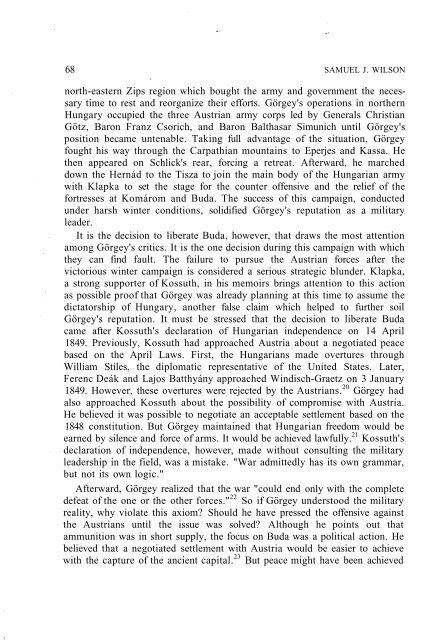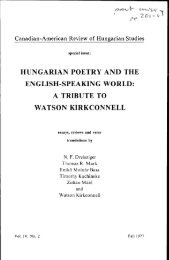68 SAMUEL J. WILSONnorth-eastern Zips region which bought the army and government the necessarytime to rest and reorganize their efforts. Görgey's operations in northernHungary occupied the three Austrian army corps led by Generals ChristianGötz, Baron Franz Csorich, and Baron Balthasar Simunich until Görgey'sposition became untenable. Taking full advantage of the situation, Görgeyfought his way through the Carpathian mountains to Eperjes and Kassa. Hethen appeared on Schlick's rear, forcing a retreat. Afterward, he marcheddown the Hernád to the Tisza to join the main body of the Hungarian armywith Klapka to set the stage for the counter offensive and the relief of thefortresses at Komárom and Buda. The success of this campaign, conductedunder harsh winter conditions, solidified Görgey's reputation as a militaryleader.It is the decision to liberate Buda, however, that draws the most attentionamong Görgey's critics. It is the one decision during this campaign with whichthey can find fault. The failure to pursue the Austrian forces after thevictorious winter campaign is considered a serious strategic blunder. Klapka,a strong supporter of Kossuth, in his memoirs brings attention to this actionas possible proof that Görgey was already planning at this time to assume thedictatorship of Hungary, another false claim which helped to further soilGörgey's reputation. It must be stressed that the decision to liberate Budacame after Kossuth's declaration of Hungarian independence on 14 April1849. Previously, Kossuth had approached Austria about a negotiated peacebased on the April Laws. First, the Hungarians made overtures throughWilliam Stiles, the diplomatic representative of the United States. Later,Ferenc Deák and Lajos Batthyány approached Windisch-Graetz on 3 January1849. However, these overtures were rejected by the Austrians. 20 Görgey hadalso approached Kossuth about the possibility of compromise with Austria.He believed it was possible to negotiate an acceptable settlement based on the1848 constitution. But Görgey maintained that Hungarian freedom would beearned by silence and force of arms. It would be achieved lawfully. 21 Kossuth'sdeclaration of independence, however, made without consulting the militaryleadership in the field, was a mistake. "War admittedly has its own grammar,but not its own logic."Afterward, Görgey realized that the war "could end only with the completedefeat of the one or the other forces." 22 So if Görgey understood the militaryreality, why violate this axiom? Should he have pressed the offensive againstthe Austrians until the issue was solved? Although he points out thatammunition was in short supply, the focus on Buda was a political action. Hebelieved that a negotiated settlement with Austria would be easier to achievewith the capture of the ancient capital. 23 But peace might have been achieved
GÖRGEY, LEE, AND PERCEPTIONS 69faster and on more equitable terms with Vienna in Hungarian hands. Certainlythe capture of the imperial city would have given greater recognition andlegitimacy to Hungary's cause and served as an important pawn in thebargaining process, provided the Hungarians could hold and defend it duringthe peace negotiations. But it is important to point out that both Vienna andMoscow fell to France during the Napoleonic wars, and Austria and Russiastill survived to see victory in 1814. Even with Vienna's capture Austria wouldnot have negotiated a settlement with Kossuth and the Hungarians, and, moresignificantly, Nicholas had already made the decision to send Russian troopsto aid Austria. Also, a previous Hungarian attempt to capture Vienna hadended in failure.One important consequence of Kossuth's declaration was that Görgey andhis actions would become more political. Görgey hoped that Austria wouldrealize it could appease the Hungarian army without defeating it by dispensingwith the octroyed constitution and guaranteeing the April Laws. 24 In his letterof 30 June 1849, Görgey wrote to Kossuth that he was fighting for the nation,not the government. He was even prepared to lay down his arms to secure thebest possible terms for Hungary. 25Previously, Klapka and Görgey agreed that the salvation of Hungary wasimpossible without foreign assistance. Kossuth's declaration prevented eitherFrance or Britain from aiding Hungary's cause. It strenghtened the resolve ofthe conservative forces in Britain, which supported tradition and the statusquo. More important, after the declaration, Britain, which considered Austria'sexistence vital to its imperial interest, had already given its consent toRussia to put an end to things in Hungary. In actuality, although Britain andFrance were concerned with Russia's increased presence in the DanubianPrincipalities, neither state was evern seriously willing to assist the Hungariancause. Görgey knew it was important to repudiate the law of 14 April in orderto stop or forestall the Russian invasion. Hungary could not defeat Austriaand Russia. The Russian invasion forces consisted of 190,000 men and 600guns. Their commander, Prince Ivan Paskevich, planned his invasion with thegoal that his forces should have between one and a half to two times as manytroops as the Hungarians in order to guarantee victory. 26 Knowing the oddswere against him, Görgey continued with the struggle in the hope of winningacceptance of the 1848 constitution. Kossuth's declaration inhibited negotiationand turned the more conservative elements in Hungary against thestruggle and toward Vienna for accommodation. The Peace Party, which hadapproached Görgey for support, reflects this reality.It is essential to understand Görgey's opinion of the events in Hungary inorder to clearly appreciate his military decisions after 14 April. Had he
- Page 1 and 2:
Papers of the Radnóti Memorial Con
- Page 3:
HUNGARIAN STUDIESVOLUME 11, 1996 CO
- Page 8 and 9:
6 GEORGE GÖMÖRIprobably Fürst an
- Page 10 and 11:
8 GEORGE GÖMÖRIof the utmost impo
- Page 12 and 13:
10 GEORGE GÖMÖRIén e földön...
- Page 14 and 15:
12 GEORGE GÖMÖRINotes1. Miklós R
- Page 16 and 17:
14 MIHÁLY SZEGEDY-MASZÁKself alwa
- Page 18 and 19:
16 MIHÁLY SZEGEDY-MASZÁKtype is r
- Page 20 and 21: 18 MIHÁLY SZEGEDY-MASZÁKpose, the
- Page 22 and 23: 20 MIHÁLY SZEGEDY-MASZÁK"Wozu Dic
- Page 24 and 25: 22 MIHÁLY SZEGEDY-MASZÁKand Wilme
- Page 26 and 27: 24 MIHÁLY SZEGEDY-MASZÁKbeen the
- Page 28 and 29: 26 MIHÁLY SZEGEDY-MASZÁKBolond, k
- Page 30 and 31: 28 MIHÁLY SZEGEDY-MASZÁK6. Emery
- Page 32 and 33: 30 ZSUZSANNA OZSVÁTHand breaks as
- Page 34 and 35: 32 ZSUZSANNA OZSVÁTHThe drama echo
- Page 36: 34 ZSUZSANNA OZSVÁTHcontinents at
- Page 39 and 40: FROM CAIN TO NAHUM 37which, as Csap
- Page 41 and 42: \FROM CAIN TO NAHUM 39and bears and
- Page 43 and 44: FROM CAIN TO NAHUM 41who sees what
- Page 45 and 46: FROM CAIN TO NAHUM 438. "A félelme
- Page 47 and 48: HELP ME, PASTORAL MUSE:THE VIRGELIA
- Page 49 and 50: HELP ME, PASTORAL MUSE 47compete! W
- Page 51 and 52: HELP ME, PASTORAL MUSE 49of a priva
- Page 53 and 54: HELP ME, PASTORAL MUSE 51Once again
- Page 55 and 56: HELP ME, PASTORAL MUSE 53Eighth Ecl
- Page 57 and 58: HELP ME, PASTORAL MUSE 55have that
- Page 59: HELP ME, PASTORAL MUSE 57Paul de Ma
- Page 62 and 63: 60 SAMUEL J. WILSONWe did, however,
- Page 64 and 65: 62 SAMUEL J. WILSONbeings and contr
- Page 66 and 67: 64 SAMUEL J. WILSONHungarians would
- Page 68 and 69: 66 SAMUEL J. WILSONthe Austrians. G
- Page 72 and 73: 70 SAMUEL J. WILSONoriginally pursu
- Page 74 and 75: 72 SAMUEL J. WILSONGörgey's decisi
- Page 76 and 77: 74 SAMUEL J. WILSONfrom occurring,
- Page 78 and 79: 76 SAMUEL J. WILSON8. Artúr Görge
- Page 80 and 81: 78 STEVEN TÖTÖSY de ZEPETNEKtört
- Page 82 and 83: 80 STEVEN TÖTÖSY de ZEPETNEKThe c
- Page 84 and 85: 82 STEVEN TÖTÖSY de ZEPETNEKher u
- Page 86 and 87: 84 STEVEN TÖTÖSY de ZEPETNEKthe b
- Page 88 and 89: 86 STEVEN TÖTÖSY de ZEPETNEKrooti
- Page 90 and 91: 88 STEVEN TÖTÖSY de ZEPETNEKcriti
- Page 92 and 93: 90 STEVEN TÖTÖSY de ZEPETNEK'My f
- Page 94 and 95: 92 STEVEN TÖTÖSY de ZEPETNEKshe d
- Page 96 and 97: 94 STEVEN TÖTÖSY de ZEPETNEKNotes
- Page 99 and 100: BERLIN ET PARIS DE LAJOS TIHANYIVAL
- Page 101 and 102: BERLIN ET PARIS DE LAJOS TIHANYI 99
- Page 103 and 104: BERLIN ET PARIS DE LAJOS TIHANYI 10
- Page 105 and 106: BERLIN ET PARIS DE LAJOS TIHANYI 10
- Page 107 and 108: BERLIN ET PARIS DE LAJOS TIHANYI 10
- Page 109 and 110: BERLIN ET PARIS DE LAJOS TIHANYI 10
- Page 111 and 112: BERLIN ET PARIS DE LAJOS TIHANYI 10
- Page 113 and 114: BERLIN ET PARIS DE LAJOS TIHANYI 11
- Page 115: BERLIN ET PARIS DE LAJOS TIHANYI 11
- Page 118 and 119: 116 KEVIN E. KELLYfilms Lugosi made
- Page 120 and 121:
118 KEVIN E. KELLYthe provinces, no
- Page 122 and 123:
120 KEVIN E. KELLYWith his brief an
- Page 124 and 125:
122 KEVIN E. KELLYboth his and Dean
- Page 126 and 127:
124 KEVIN E. KELLYfollowed it into
- Page 128 and 129:
126 KEVIN E. KELLYvampiric nobleman
- Page 130 and 131:
128 KEVIN E. KELLYThe film also boo
- Page 132 and 133:
130 KEVIN E. KELLYWood remained one
- Page 134 and 135:
132 KEVIN E. KELLYLugosi, convinced
- Page 136 and 137:
134 KEVIN E. KELLY19. Lennig, 112-1
- Page 139 and 140:
THE AGON OF IRONY AND SATIREIN GYÖ
- Page 141 and 142:
THE AGON OF IRONY AND SATIRE 139poe
- Page 143 and 144:
THE AGON OF IRONY AND SATIRE 141tra
- Page 145 and 146:
THE AGON OF IRONY AND SATIRE 143fek
- Page 147 and 148:
THE AGON OF IRONY AND SATIRE 145ner
- Page 149 and 150:
THE AGON OF IRONY AND SATIRE 147whi
- Page 151 and 152:
THE AGON OF IRONY AND SATIRE 149mov
- Page 153 and 154:
THE AGON OF IRONY AND SATIRE 151for
- Page 155 and 156:
THE AGON OF IRONY AND SATIREA harma
- Page 157 and 158:
MURDER IN THE MOUNTAINSTranslated b
- Page 159 and 160:
MURDER IN THE MOUNTAINS 157"Afraid?
- Page 161 and 162:
MURDER IN THE MOUNTAINS 159Abády,
- Page 163 and 164:
MURDER IN THE MOUNTAINS 161"The mar
- Page 165 and 166:
MURDER IN THE MOUNTAINS 163Bálint
- Page 167 and 168:
MURDER IN THE MOUNTAINS 165"That is
- Page 169 and 170:
MURDER IN THE MOUNTAINS 167at hand,
- Page 171 and 172:
CONTRIBUTORSMiklós BÁNFFYLászló
















